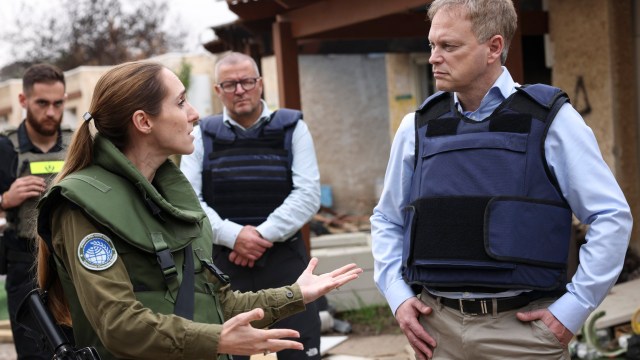Britain must spend more of its money on the military, the Defence Secretary has warned – setting up a funding clash with the Treasury.
Grant Shapps called for the defence budget to rise by as much as 50 per cent in the light of global crises including the invasion of Ukraine and Israel’s war in Gaza.
In a highly unusual intervention, he insisted that he stands by previous calls for the UK to spend at least 3 per cent of its GDP on defence, rather than just above 2 per cent as now.
Rishi Sunak and Jeremy Hunt have previously backed the principle of increasing military funding to 2.5 per cent of GDP, but only when it is affordable.
Mr Shapps told The Sunday Times: “There are plenty of countries, even G7 countries, which spend 1 or 2 per cent of GDP on defence. We can’t secure our prosperity and way of life by skimping on our basic defence.
“And that’s why we said, we will spend 2.5 per cent as soon we can. I’ve spoken previously about the need to go to 3 per cent and I don’t resile from that at all. I think we need to go to 3 per cent and possibly higher… and I think the rest of the West is going to have to do the same.”
In 2022 the UK defence budget amounted to 2.16 per cent of GDP, according to Nato data. Britain has been one of the few Nato members to hit the target of spending at least 2 per cent consistently in recent years.
Boris Johnson said that Britain’s military budget should rise to 2.5 per cent by the end of this decade, and the current Prime Minister says he is also committed to that goal but without a firm timeline.
Most Nato members systematically reduced defence spending after the end of the Cold War, allowing them to increase other forms of public spending without putting up taxes. The past few years have seen a reversal of those trends in light of increased aggression from Russia and China.
Ben Wallace, who was the previous Defence Secretary, has called for the Government to speed up the delivery of highly polluting cars which are being scrapped because of London’s ultra low emissions zone to the front line in Ukraine.
Sadiq Khan gave the green light to send the vehicles to Ukraine after a brief row over whether he could approve the plan. Mr Wallace wrote in the Sunday Telegraph: “Despite recent controversy over the proposed project to send ageing ‘Chelsea tractors’ from Kensington to Kyiv, this enlightened idea must come to fruition.
“It can be done quickly – now, in fact – since the hold-up is over a simple bureaucratic issue that is easily overcome. With immediate action from the Transport Secretary and logistical support from the Ministry of Defence, we can get this process moving and hand Ukraine a much-deserved Christmas present.”
Interviewed in the same newspaper, David Cameron said that Britain would seek to increase the aid it provides to Ukraine above the £2bn level reached this year.
